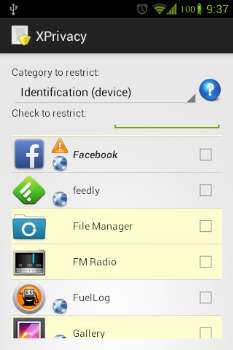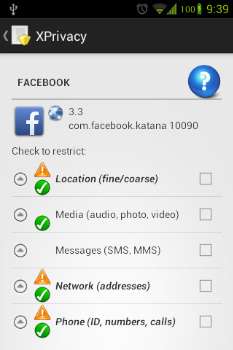Minimum Requirements: Android 4.0+ (ICS) or 4.1+ (JellyBean), check with System Settings > About phone > Android version
Price: $3.91
Release Note: Pro features unlocked

XPrivacy doesn't revoke (i.e. block) permissions from an application, which means that most applications will continue to work as before and won't force close. There are two exceptions to this, access to the internet and to external storage (typically an SD card) is restricted by denying access (revoking permissions). There is no other way to realize this, since these permissions are handled by Android in a special way. Android delegates handling of these permission to the underlying Linux network/file system.
If restricting a category of data for an application results in problems for the application, it is possible to allow access to the data category again to solve the issue.
By default, all newly installed applications will have no access to any data category at all, to prevent a new application from leaking sensitive data right after installation. Shortly after installing a new application, XPrivacy will ask which data categories you want the new application to have access to. XPrivacy comes with an application browser, which allows you to quickly enable or disable applications' access to a particular data category (i.e. to view and control all access to the camera, for example). It is also possible to edit all data categories for one application.
To help you identify potential data leaks, XPrivacy will monitor attempts made by all applications to access sensitive data. XPrivacy will display a yellow triangle icon as soon as data of a data category has been used. XPrivacy will also display if an application has internet access, indicating that the application poses a risk of sharing the data it obtains with an external server. This is just a guideline, since an application could access the internet through other applications too. If an application has requested Android permissions to access data in a data category, this will be displayed with a green tick icon, but this will only be shown when looking at an individual application, since checking permissions for all applications is quite slow.
XPrivacy is built using the Xposed framework. XPrivacy taps into a number of selected functions of Android through the Xposed framework. Depending on the function, XPrivacy conditionally skips execution of the original function (for example when an application tries to set a proximity alert) or alters the result of the original function (for example to return empty calendar data).
XPrivacy has been tested with CyanogenMod 10 and 10.1 (Android 4.1 and 4.2), and will most likely work with any Android version 4.1 or 4.2 variant, including stock ROMs. Root access is needed to install the Xposed framework. Because of a bug in the Xposed framework, XPrivacy currently needs a fixed Xposed binary, which is provided as download for both Android version 4.1 and 4.2.
XPrivacy Features
Simple to use
No need to patch anything (no source, no smali or anything else)
For any (stock) variant of Android version 4.1 or 4.2 (JellyBean)
Newly installed applications are restricted by default
Displays data actually used by an application
Free and open source
XPrivacy Restrictions
For easy usage, data is restricted by category:
Accounts
return an empty account list
return fake account info
return empty authorization tokens
Boot
prevent applications to start during device startup
Browser
return an empty bookmark list
return empty search history
Calendar
return an empty calendar
Calling
prevent calls from being placed
prevent SMS messages from being sent
prevent MMS messages from being sent
prevent data messages from being sent
Contacts
return an empty contact list
Dictionary
return an empty user dictionary
Identification
return a fake Android ID
return a fake device serial number
Internet
revoke access to the internet
Location
return a random or set location
return empty cell location
return an empty list of (neighboring) cell info
prevents proximity alerts from being set
prevents sending NMEA data to an application
prevent phone state from being sent to an application
Cell info changed
Cell location changed
prevent sending extra commands (aGPS data)
Media
prevent recording audio (including from the microphone)
prevent taking pictures
prevent recording video
you will be notified if an application tries to perform any of these actions
Messages
return an empty SMS/MMS message list
return an empty list of SMS messages stored on the SIM (ICC SMS)
return an empty list of voicemails
Network
return fake IP's
return fake MAC's (network, Wi-Fi, bluetooth)
return fake BSSID/SSID
return an empty list of Wi-Fi scan results
return an empty list of configured Wi-Fi networks
return an empty list of bluetooth devices
NFC
prevent receiving NDEF discovered
prevent receiving TAG discovered
prevent receiving TECH discovered
Phone:
return a fake own/in/outgoing/voicemail number
return a fake subscriber ID
return a fake phone device ID
return a fake ISIM/ISIM domain
return a fake IMPI/IMPU
return a fake MSISDN
return fake mobile network info (country, operator/name)
return fake SIM info (serial number, country, operator/name)
return empty APN list
Code: Select all
http://en.wikipedia.org/wiki/Access_Point_Name
return no currently used APN
return an empty call log
return an empty list of voicemail messages
prevent phone state from being sent to an application
Call forwarding indication
Call state changed (ringing, off-hook)
Mobile data connection state change / being used
Message waiting indication
Service state changed (service/no service)
Signal level changed
Storage
revoke permission to the internal storage (media)
revoke permission to the external storage (SD card)
Shell
Linux shell
Superuser shell
Load/library
System
return an empty list of installed applications
View
prevent links from opening in the browser
you will be notified if an application tries to open a link
XPrivacy Limitations
Android can be restricted, but there will be no usage data available (orange triangles)
XPrivacy Installation
It seems like a lot of steps, but it is done in no time:
Requirement: Android 4.0+ (ICS) or 4.1+ (JellyBean), check with System Settings > About phone > Android version
Make a backup
If not done already: root your device; the procedure depends on the brand and model of your device
Enable System settings > Security > Unknown sources
Install the Xposed framework
Code: Select all
http://forum.xda-developers.com/showthr ... ?t=1574401
Be sure to follow all installation steps
Be sure to install the latest version 2.1.4
Download and copy the Xposed disabler to your SD card to disable Xposed in case of troubles
MIUI is not supported by Xposed
Code: Select all
http://en.miui.com/
Enable XPrivacy from the Xposed installer
Reboot into recovery
Flash the Xposed fix for your Android version from
Code: Select all
http://goo.im/devs/M66B/xprivacy
Android ICS 4.0.x / CM9: Xposed_fix_4.0.zip
Android JB 4.1.x / CM10: Xposed_fix_4.1.zip
Android JB 4.2.x / CM10.1: Xposed_fix_4.2.zip
This fix is only for Xposed version 2.1.4
Alternatively download from
Code: Select all
http://d-h.st/users/M66B/?fld_id=19078#files
Reboot
What's New in this version:
V0.42
Display notification when XPrivacy is not enabled also when Xposed installer is not present
Better ICS compatibility (issue)
Fixed usage data for Build.SERIAL
Fixed crash on back (issue)
Added Russian translation
Updated French translation
Updated German translation
Updated Japanese translation
Updated Polish translation
Updated Slovenian translation
XPrivacy PRO Screenshots:


XPrivacy was a lot of work, so please support this project
if you enjoy this XPrivacy application please consider buying the original pro version from market to support the development
Code: Select all
https://play.google.com/store/apps/deta ... rivacy.pro
Download XPrivacy 0.42 PRO Unlocked Android
Code: Select all
http://ul.to/zqvty2mn
http://bitshare.com/files/4tn387v7/TqC2 ... d.zip.html
